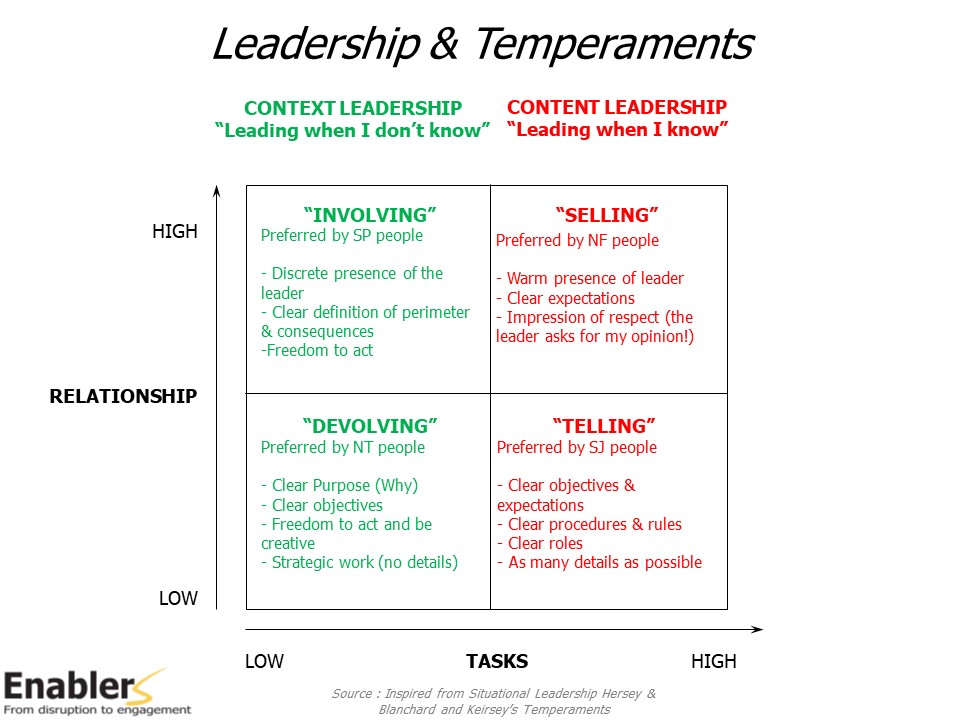Building on last week’s article, summarising the M.B.T.I. (Myers-Briggs Type Indicator) preferences, I’d like to explore the link between it and leadership styles.
In our practice, we like to refer to an old (1969) and still so amazingly actual model, Hersey and Blanchard’s Situational Leadership, which we have slightly updated:
The model suggests that leaders can (on the horizontal axis) place a lot/no emphasis on “getting the job done” (task orientation). On the vertical axis, the same leader may be very/not relational (relationship orientation). This implies four styles (partially renamed by us): Tell (High Task/Low Relationship orientation): “There is a problem and that’s what we’ll do!”, Sell/Convince (High Task/High Relationship orientation): “There is a problem, I recommend X. Does any one have a better idea?”, Involve (Low Task/High Relationship orientation): “There is a problem, what do you recommend?” and Devolve (Low Task/Low Relationship orientation): “While you were gone, this problem emerged, boss, and this is how we solved it!”. The theory suggests that the levels of urgency (of the situation) and/or maturity of your subordinates (in dealing with the situation) should indicate the most appropriate style in dealing with the situation (hence the name of “Situational Leadership”).
The picture here above attempts to explain how different preferences react to the different styles of Leadership:
- SJ’s (Guardians) tend to prefer order, clarity on details, rules, roles and procedures. They prefer certainty. They respect hierarchy and demand the same respect from their subordinates. At the condition, of course, that the telling style be respectful, sufficiently clear on the what and how, to grant them a full independence on implementation, SJ’s will feel comfortable with a directive style. In a leadership position, one may expect clear instructions, from an SJ leader, as well as, precise objectives and, if required, details on how to reach them. A SJ leader may sometimes come across as controlling and micro-managing. Because, they are people who like to hold their promises, SJ leaders are anxious to ensure that their teams are duly equipped to reach them and deliver what was promised to the top.
- NF’s (Idealists) will feel flattered to be asked for their opinion on how to solve an issue. And what matters most to them, will be the fact that the leader will be present and relational. Being naturally gifted at “smelling” and dealing with manipulation (I must be one of the few exceptions to that rule????) they will rapidly call a leader off, if his style of Selling hides an intention of Tell behind a façade of Sell. Clarity on the tasks (after a good discussion) and, more important, the impression that their point of view matters to the leader, will help NF’s feel comfortable with the Sell style. NF leaders tend to engage rather than convince or dictate. They tend to lead in an Involve way and are happy to follow a Sell leader. NF leaders tend to engage through their passion, which is fine as long as you respond positively to it. The officers daring not to share the Passion or intimate conviction of their Führer (several sources suggest he was a NF) remember though how painful it could be for their ego and career advancement. NF leaders find it challenging to deal with people not sharing the enthusiasm they have for the cause.
- SP’s (Trouble-shooters) need freedom to try and learn by doing but they usually appreciate a relational and present style of leadership. A hands-off on the task leader, who will nevertheless be present to encourage, support and create fun and a nice experience (Involve), will be appreciated by SP preferences. Since SP’s tend to tolerate their leaders as long as those truly lead by example, they seek to be exemplary leaders themselves. But don’t be fooled, “exemplary” in their eyes, doesn’t mean scrupulously apply the rules and follow the procedures… It means create conditions for my people to do and be their best.
- NT’s (Visionaries) are a very independent breed. They are not “freedom seekers” nor rebellious, they need to feel that they are trusted, that their competences are recognised and that they are relied upon to provide a result that will build on their knowledge. Devolve is a style they will particularly appreciate and strive-on. Since NT’s love to be independent, don’t expect them to “baby-sit” nor cuddle their team. Their expression of respect and appreciation for the people they lead, is to ensure they clearly understood the “Why” and let them get on with it.
These reflections should not be taken too literally nor rigidly. It is the situation that should be considered before any other consideration. Second, M.B.T.I. is not supposed to “put people into boxes”. My preference is NF and I remember feeling clearly safer with telling style ski instructors as I felt that my physical integrity on the slope would depend from her/his “orders” (Tell). I felt honoured and appreciated when my chief scouts, wishing to develop our self-organisation skills, were asking us our opinion prior to preparing the campsite, the food or the fire(Sell). When collaborating with NEOMA Executive Education, or our allies of StratX, I very much enjoy the friendly presence of the leading partners there who demonstrate their fullest confidence in my capacity to fulfil their mandate (Involve). Finally, I feel far more at ease writing such articles or my future book, on my own and independently, than co-writing them (Devolve).
This article’s purpose was mainly to have your reflecting on the possible connections between people preference and how to create conditions for them to flourish and two well researched tool, M.B.T.I. and Situational Leadership. Next week, we will explore M.B.T.I. and the impact of the Disruption Economy.





0 Comments